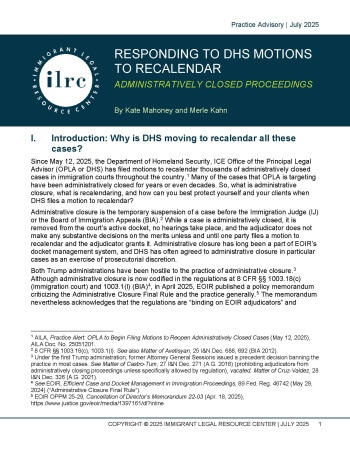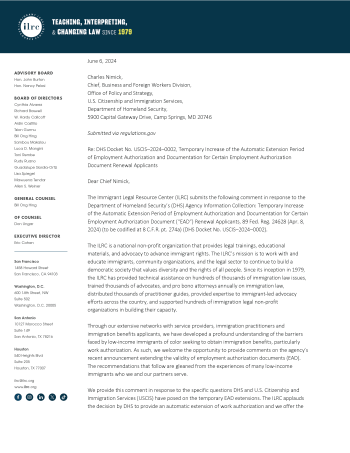Term Page
DACA
On July 28, 2025, the ILRC submitted a comment opposing a new government proposal to add extra questions to nine immigration forms, including applications for naturalization, asylum, and green cards.
On July 16, 2025, ILRC submitted a comment opposing a new U.S. Citizenship and Immigration Services (USCIS) policy that allows the agency to use “derogatory information” against immigration applicants without always disclosing it.
On May 2, 2025 the ILRC submitted a letter signed by 115 organizations has opposing a U.S. Citizenship and Immigration Services (USCIS) proposed rule to expand the information collected on immigration forms.
On May 2, 2025 the ILRC submitted a comment opposing a proposed U.S. Citizenship and Immigration Services (USCIS) rule that would expand the collection of personal information from immigration applicants.
On May 5, 2025 the ILRC submitted a comment opposing a proposed U.S. Citizenship and Immigration Services (USCIS) rule that would require immigrants to disclose their social media identifiers on application forms.

In recent months, the Department of Homeland Security has begun filing thousands of motions to recalendar administratively closed proceedings. This trend is raising questions about how attorneys and accredited representatives can respond to these motions and protect their clients’ interests, particularly in cases that have been administratively closed for many years. This advisory explores those questions and offers strategy considerations when determining how to proceed in each case.
The Trump administration’s Registration requirement for most undocumented immigrants is another hateful tactic in its campaign to cause panic and fear throughout the country. The Department of Homeland Security (DHS) has been clear that the central purpose of Registration is to gather information about all noncitizens and use this information to locate, apprehend and remove them as quickly as possible. The new registration requirement took effect April 11, 2025.
On January 17th, 2025, the Fifth Circuit Court of Appeals (“Court”) issued its latest decision in the ongoing DACA litigation. While nothing has changed, and current DACA recipients can continue to renew their DACA and obtain both protection from deportation and work authorization, it is important to understand what the current state of DACA is and what can change in the future.

On June 6, 2024, the ILRC submitted a comment in support of DHS’s temporary final rule (TFR) providing automatic extensions of employment authorization documents. The TFR specifically requested comment on whether the measure should be permanent and how long permanent automatic extensions should be. The ILRC wrote in support of a long and permanent auto-extension policy to ensure that applicants are not harmed by administrative delays that lead to lapses in document validity.
The U.S. immigration system treats children and young people differently than adults. It is important to understand how your age may impact your options for seeking relief or protection against deportation. This Community Explainer highlights how age impacts eligibility for certain forms of immigration relief, how immigrant youth can help themselves and their family members, and how to learn more.